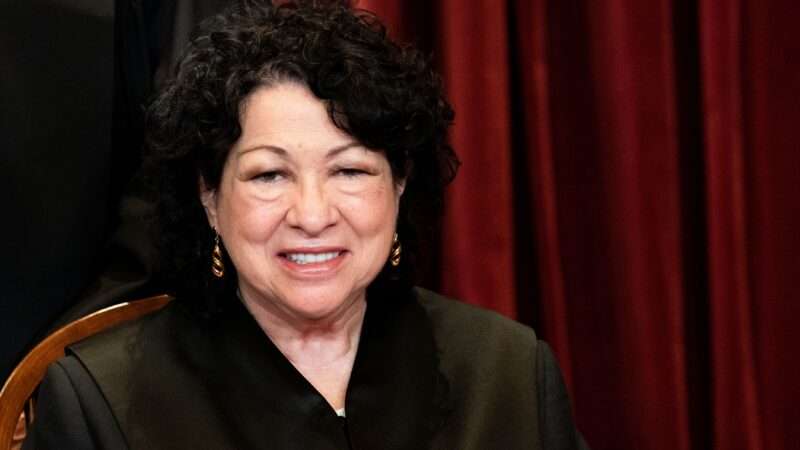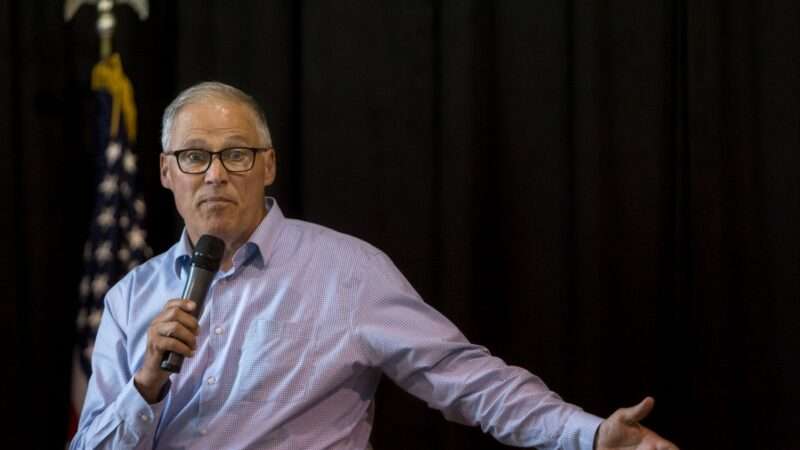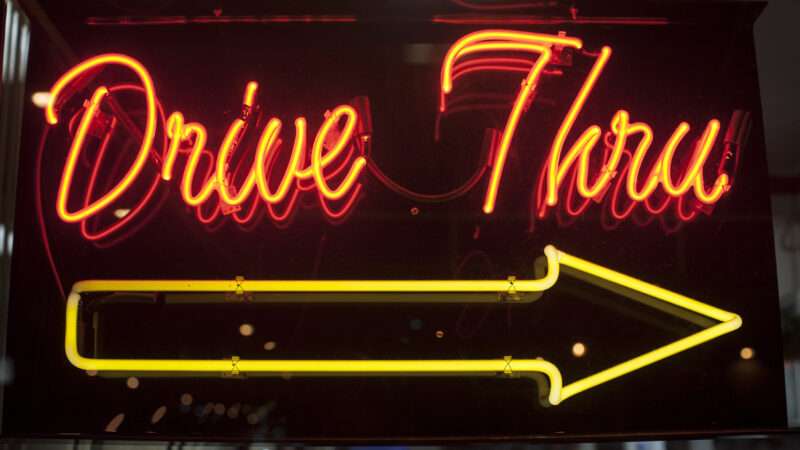
On Friday, when the Supreme Court considered whether it should block enforcement of the Biden administration’s COVID-19 vaccine mandate for private employers, most of the discussion focused on whether the Occupational Safety and Health Administration (OSHA) has the statutory authority to issue that rule. But the justices and lawyers also touched on a constitutional argument against the mandate, one that hinges on the distinction between state and federal powers.
Justice Sonia Sotomayor claimed not to understand this distinction.
OSHA’s “emergency temporary standard” (ETS), which it published on November 5, demands that companies with 100 or more employees require them to be vaccinated or wear face masks and submit to weekly virus testing. While arguing that OSHA does not have the power to issue such an order, Ohio Solicitor General Benjamin Flowers said “there may be many states, subject to their own state laws, that could impose this [policy] themselves.” Sotomayor said she found that concession puzzling.
“If it’s within the police power to protect the health and welfare of workers,” she said, “you seem to be saying the states can do it, but you’re saying the federal government can’t, even though it’s facing the same crisis in interstate commerce that states are facing within their own borders. I’m not sure I understand the distinction—why the states would have the power but the federal government wouldn’t.”
Flowers noted that “the federal government has no police power”—the general authority to enact legislation aimed at protecting public health, safety, morals, and welfare. While states retain that broad authority under the Constitution, the federal government is limited to specifically enumerated powers. This principle is reflected in the 10th Amendment, which says “the powers not delegated to the United States by the Constitution, nor prohibited by it to the States, are reserved to the States respectively, or to the people.”
Sotomayor alluded to one of those delegated powers: the regulation of interstate commerce, which is the constitutional rationale for the law that authorizes OSHA to issue regulations aimed at protecting employees from workplace hazards. But when Flowers noted that the Commerce Clause, notwithstanding how broadly the Supreme Court has interpreted it, does not give the federal government a general police power, Sotomayor seemed to disagree:
Sotomayor: It does have power with respect to protecting the health and safety of workers. We have accept[ed] the constitutionality of OSHA.
Flowers: Yes. I took you to be asking if they had a police power to protect public health.
Sotomayor: No, they have a police power to protect workers.
Flowers: I would not call it a police power. I think the Commerce Clause power allows them to address health…in the context of the workplace.
Sotomayor: Exactly.
At this point, Chief Justice John Roberts interrupted the exchange, saying, “It’s a good time to move to our sequential questioning.”
Sotomayor’s reference to a federal “police power” was not quite as striking as her false claims about the omicron variant’s impact on children. But her exchange with Flowers raised some eyebrows.
“Sotomayor professed not to be able to understand the distinction between federal authority and state police powers,” National Review‘s Isaac Schorr wrote. “Sotomayor claims not to understand [the] distinction between state and federal power,” Ilya Shapiro, director of the Cato Institute’s Robert A. Levy Center for Constitutional Studies, tweeted. “Mind-boggling. Calls OSHA’s regulatory authority…a ‘police power.’ OH SG tries to explain con law 101, eventually Roberts rescues the embarrassing discourse.”
Perhaps Sotomayor misspoke, referring to a “police power” when what she really had in mind was the federal government’s authority under the Commerce Clause. But the extent of that authority—and whether it covers a policy that arguably amounts to a general vaccine mandate—is one of the issues in this case.
When the U.S. Court of Appeals for the 5th Circuit extended its stay on the ETS in November, the unanimous three-judge panel said the mandate “likely exceeds the federal government’s authority under the Commerce Clause because it regulates noneconomic inactivity that falls squarely within the States’ police power.” After the challenges to the ETS were consolidated and assigned to the U.S. Court of Appeals for the 6th Circuit, a divided three-judge panel lifted that stay. In addition to the other arguments that the 5th Circuit found persuasive, the majority rejected the idea that the ETS “regulates noneconomic inactivity”—i.e., the choice to forgo vaccination. That claim “miss[es] the mark,” Judge Jane Stranch wrote, because “the ETS regulates employers with more than 100 employees, not individuals,” and “it is indisputable that those employers are engaged in commercial activity that Congress has the power to regulate when hiring employees, producing, selling and buying goods, etc.”
Prior to that decision, 6th Circuit Chief Judge Jeffrey Sutton had expressed more sympathy for the Commerce Clause argument against the ETS. “Does this regulation of noncommercial inactivity—a requirement that the unvaccinated get shots or weekly tests—exceed Congress’s Commerce Clause power?” Sutton asked in a dissent when 16 judges split evenly on the question of whether they should hear the case rather than leave it to a three-judge panel. “It’s doubtful this federal power sweeps this broadly given the vertical separation of powers embedded in our Constitution. There is a Commerce Clause, yes. It gives Congress broad powers, to be sure. And it helps the Federal Government to resolve some collective-action problems affecting interstate commerce, no doubt. But through it all, it remains a Commerce Clause, not a collective-action clause—and not a clause that grants the national government all of the police powers customarily associated with state governments in order to fix any new societal challenge.”
Shapiro makes the same point in a Newsweek essay. “It’s axiomatic to the American system of government that sovereignty is divided such that states wield power in their domains, while Washington, D.C. governs national issues like defense and interstate commerce,” he writes. “Modern constitutional law has blurred that distinction and expanded federal power, but there’s still no question that the Virginia Department of Labor could impose an occupational vaccine mandate in my home state, while OSHA’s attempt to do so has literally become a federal case.”
Shapiro notes that “federal lawmaking powers are constitutionally enumerated—and thus limited to those listed in Article I, Section 8—while states enjoy a broader ‘police power’ to regulate on behalf of public health, safety, welfare and morals.” This is the crucial distinction that Sotomayor blurred when she talked about a federal “police power.”
When President Joe Biden announced the OSHA rule in September, he presented it as part of his plan for “vaccinating the unvaccinated.” MSNBC anchor Stephanie Ruhle called the ETS “the ultimate work-around for the Federal govt to require vaccinations.” White House Chief of Staff Ronald Klain retweeted Ruhle’s comment, reinforcing the impression that Biden was trying to disguise a general vaccine mandate as a workplace safety measure authorized by the Commerce Clause.
On Friday, Chief Justice John Roberts alluded to that incident, saying the ETS “has been referred to…as a work-around.” Justice Neil Gorsuch used the same term. “Given that no federal agency can impose a general mandate, precisely because the federal government lacks a police power,” Shapiro writes, “OSHA’s ‘work-around’ is just an attempted short-circuiting of the law.”
The post Defending OSHA's Vaccine Mandate, Sonia Sotomayor Says 'I'm Not Sure I Understand the Distinction' Between State and Federal Powers appeared first on Reason.com.
from Latest – Reason.com https://ift.tt/3tjGKmB
via IFTTT

